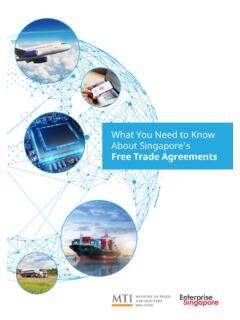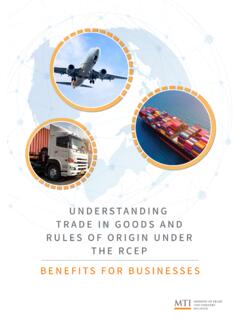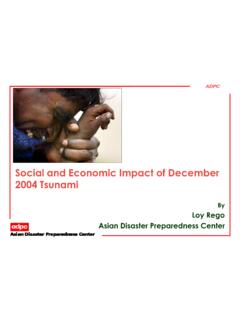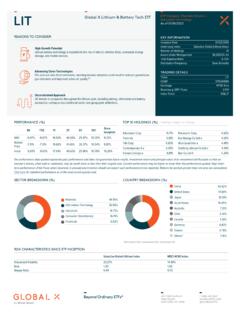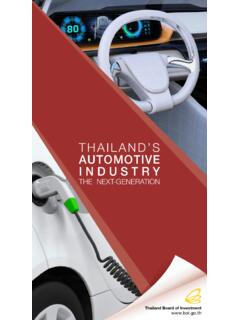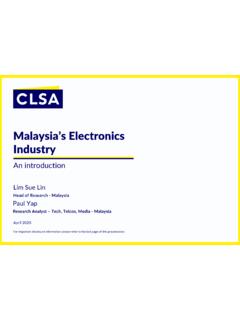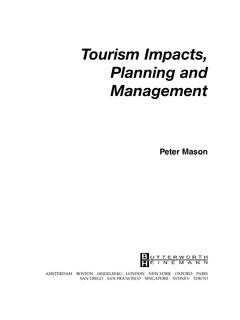Transcription of FEATURE ARTICLE IMPACT OF THE COVID-19 PANDEMIC ON …
1 FEATURE ARTICLEIMPACT OF THE COVID-19 PANDEMIC ON THE SINGAPORE ECONOMYTHE FORECAST FOR SINGAPORE S 2020 GDP GROWTH IS DOWNGRADED TO 7% TO 4%THE IMF EXPECTS THE GLOBAL ECONOMY TO CONTRACT BY 3% IN 2020 INTRODUCTIONThe COVID-19 PANDEMIC has caused a severe disruption to global economic activity and has led to both demand- and supply-side shocks to the Singapore IMPACT of COVID-19 on the Singapore economy has been broad and significant, affecting different sectors of the economy to varying most sectors are expected to be adversely affected by the COVID-19 outbreak, there are some bright spots in the economy, including new opportunities that have come with the rise in demand for online sales and services. In the months ahead, MTI will continue to closely monitor developments in the global and Singapore economies as the COVID-19 situation remains fluid.
2 Globally, there continues to be a high degree of uncertainty over the length and severity of the outbreak, as well as the trajectory of the recovery in the global economy. ECONOMIC IMPACTCONCLUSIONA ccommodationAir TransportArts, Entertainment& Recreation (AER)SEVERELY AFFECTEDFood ServicesRetail TradeLand TransportSIGNIFICANTLY AFFECTEDMODERATELY AFFECTED OUTWARD ORIENTED MODERATELY AFFECTED DOMESTICALLY ORIENTED 2020201920182017 GLOBAL GDP GROWTHO ther Servicesexcluding AERO ther BusinessServicesConstructionReal EstateManufacturingWholesale TradeOther Transportation& StorageProfessionalServicesFinance &InsuranceInformation & Communications36 ECONOMIC SURVEY OF SINGAPORE FIRST QUARTER 2020 FEATURE ARTICLE1. INTRODUCTION Since the outbreak of the Coronavirus Disease 2019 ( COVID-19 ) early this year, the virus has spread rapidly across the world, and more than 5 million people in over 200 countries have been infected to-date.
3 In order to control the spread of the virus, many countries have implemented strict public health measures, including lockdowns and border closures to limit the movement of people. This has led to significant disruptions in global economic activity. As a result, the International Monetary Fund (IMF) has sharply revised its forecast for global growth downwards. Specifically, the IMF is now projecting that the global economy will contract by 3 per cent in 20202, a reversal from the per cent growth projected earlier, with full-year recessions expected in most of the major advanced and emerging economies [Exhibit 1].Against this backdrop, we can expect both demand- and supply-side shocks to the Singapore economy. On the demand-side, the global recession will lead to a sharp drop in external demand for the goods and services produced in Singapore.
4 On the supply-side, the widespread curtailment of economic activity around the world has caused global supply chain disruptions, which have in turn affected some business operations in views expressed in this paper are solely those of the authors and do not necessarily reflect those of the Ministry of Trade and Industry (MTI).1 The COVID-19 PANDEMIC has severely disrupted global economic activity, and led to both demand- and supply-side shocks to the Singapore economy. Given the fast-evolving situation, it is important for policymakers to leverage high-frequency and real-time economic indicators to monitor the effects of COVID-19 on the Singapore economy. The IMPACT of COVID-19 on the Singapore economy has been significant. Sectors that have been the most severely affected are those that rely on international travel, including the air transport, accommodation and other tourism-related sectors.
5 Consumer-facing sectors such as retail and food services have also been badly affected by the cutback in domestic consumption amidst progressively stricter safe distancing measures. At the same time, outward-oriented sectors like manufacturing and wholesale trade have been affected by the fall in external demand and supply chain disruptions, while domestically-oriented sectors like construction and real estate have been affected by negative spillovers arising from the downturn in the domestic economy. However, there are also bright spots in the economy, with the rise in demand for online sales and services. Taking these factors into account, MTI has further downgraded the 2020 GDP growth forecast for the Singapore economy to per cent to per cent , from per cent to per cent.
6 1 We would like to thank Yong Yik Wei, Kuhan Harichandra, Andy Feng and Kenneth Yeow for their useful suggestions and This is the forecast announced in the IMF s April World Economic Outlook (WEO).EXECUTIVE SUMMARY37 ECONOMIC SURVEY OF SINGAPORE FIRST QUARTER 2020 FEATURE ARTICLED omestically, the measures implemented to contain the outbreak are also expected to have an IMPACT on the Singapore economy. First, tighter border controls have been introduced to prevent the importation of COVID-19 cases, even as other countries have also imposed travel restrictions to protect their borders. These global and domestic travel restrictions have led to a sharp fall in tourist arrivals and air passengers handled at Changi Airport, thereby dampening the demand for tourism- and air transport-related services in Singapore.
7 Second, progressively stricter safe distancing measures, culminating in the Circuit Breaker period from 7 April to 1 June, have also been implemented to reduce the community spread of COVID-19 in Singapore. While such measures are necessary to protect and save lives, they have further dampened domestic economic activity, especially given the closure of non-essential workplaces, and led to deeper cutbacks in domestic consumption. Overall, the IMPACT of the COVID-19 PANDEMIC on the Singapore economy is expected to be significant. The next section details the IMPACT of COVID-19 on the different sectors of the Singapore economy, as well as some of the high-frequency, real-time indicators used to monitor the effects of COVID-19 at the overall economy and sectoral levels. 2. ECONOMIC IMPACT OF COVID-19 Given the highly-fluid situation, the Ministry of Trade and Industry (MTI) is tapping on high-frequency and real-time indicators, in addition to traditional indicators, to monitor the latest economic developments and assess the IMPACT of COVID-19 on the Singapore economy.
8 Apart from monitoring the real-time economic indicators that have been developed in-house, MTI has also worked with public and private sector partners to obtain new sources of non-traditional high-frequency data such as daily data on credit card spending, online food orders and electricity consumption, which can provide an indication of the health of different aspects of the Singapore economy on a more timely basis. At the overall economy level, MTI s own Singapore News Economic Sentiments Index3 (SNES), which analyses text data from daily local news, provides MTI with a real-time sensing of economic sentiments in Singapore [Exhibit 2]. Not surprisingly, the COVID-19 outbreak has weighed heavily on economic sentiments. Specifically, the daily SNES (7-day moving average) declined from on 23 January (when the first confirmed COVID-19 case in Singapore was announced) to by end-January, reaching levels similar to that seen in March 2003 during the SARS outbreak.
9 20192020fWorld Kong of Exhibit 1: World GDP Growth ForecastsPer CentSource: IMF World Economic Outlook (April 2020), Asia Pacific Consensus Forecasts3 The SNES Index is measured within a range of -1 to 1. A fall in the index indicates that economic sentiments have weakened. A value below 0 indicates that the overall economic sentiment is negative. See Lam (2016) and Chia & Foo (2018) for more details of the SNES, including the methodology used to construct the SURVEY OF SINGAPORE FIRST QUARTER 2020 FEATURE ARTICLE At the sectoral level, the COVID-19 PANDEMIC is expected to affect the different sectors of the Singapore economy to varying degrees and through different transmission channels, as illustrated in Exhibit 3. Exhibit 2: Daily Singapore News Economic Sentiments (January to April)Source: Authors estimatesSentiments then began to see a gradual recovery until 9 March, when news of the oil price war between Saudi Arabia and Russia, as well as the World Health Organisation s declaration of COVID-19 as a global PANDEMIC caused sentiments to plunge again, reaching by 17 March.
10 Sentiments have fluctuated at around this low level since 3: IMPACT of COVID-19 on Different Sectors of the Singapore Economy44 The rest of the economy not covered in this framework comprises Other Goods Producing Industries, Utilities and Ownership of Mar: WHO declares COVID-19global pandemic9 Mar: Saudi Arabia announces unexpected oil price cut23 Jan: First confirmed case of COVID-19in Jan10 Jan17 Jan24 Jan31 Jan7 Feb14 Feb21 Feb28 Feb6 Mar13 Mar20 Mar27 Mar3 Apr10 Apr17 Apr24 AprIndex, 7 Day Moving AverageSeverelyaffectedSignificantlyaffe ctedModeratelyaffected(Outward-oriented) Moderatelyaffected(Domestically-oriented )AccommodationAir TransportArts, Entertainment & Recreation (AER)Food ServicesRetail TradeLand TransportManufacturingWholesale TradeOther Transportation & StorageInformation & CommunicationsProfessional ServicesFinance & InsuranceConstructionReal EstateOther Business ServicesOther Services ex AERD omestic OutbreakBorder ControlsSafe DistancingFall in Tourist ArrivalsFall in Domestic ConsumptionFall in External Demand and Supply Chain DisruptionsNegative Spillovers from Slowdown in Domestic ActivityClosure of workplaces due to Circuit Breaker measures has affected most industries39 ECONOMIC SURVEY OF SINGAPORE FIRST QUARTER 2020 FEATURE ARTICLE5 The Google Search Trends track how often specific key words, subjects and phrases have been entered into Google s search engine over a period of time.
